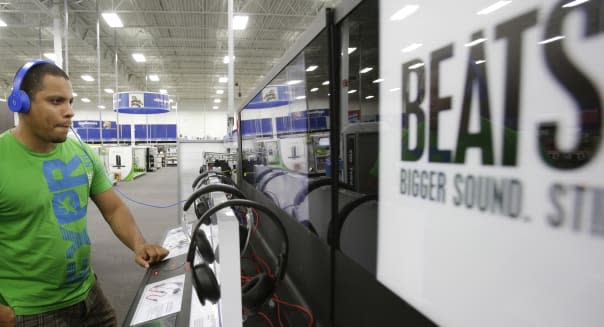Why Can't Apple, Google or Microsoft Beat Spotify or Pandora?

Beats Electronics and Beats Music won't turn Apple (AAPL) into a streaming-audio rock star overnight, but for $3 billion, Apple gets to add a leading maker of premium headphones and a young, promising streaming music service to its lineup. More importantly, the deal gives Apple hip hop icon Dr. Dre and legendary record producer Jimmy Iovine as key executives who can perhaps breathe new life into its fading iTunes music platform.
Right now, the tech giants seem to have it all. Apple, Google (GOOG), and aging software behemoth Microsoft (MSFT) have tens of billions in the bank and long track records of success. But none of them have found cracking the streaming music market to be easy. All three dot-com giants have invested in their own online music platforms, but it's Spotify and Pandora (P) that are turning heads -- and connecting to headphones.
The Unlikely Kings of Music
Spotify and Pandora have different formulas, but both have been successful -- for them. Sweden's Spotify, with more than 10 million premium subscribers, offers users the ability to pick the tracks they want to hear, and customers are willing to pay as much as $10 a month for the right to take their commercial-free playlists to mobile devices. Its on-demand model became a sensation through Europe before hitting the U.S. three summers ago.
Pandora doesn't allow listeners to pick the tracks. It uses algorithms to develop playlists based on user preferences. It is primarily consumed as a free service with ad blocks. Just 3.3 million of its 76 million active listeners pay to enjoy Pandora as a commercial-free experience. They enjoyed 1.7 billion hours of audio content last month
Microsoft and Google decided to follow Spotify's model with Xbox Music in late 2012 and Google Music a few months later. Neither company has offered up metrics on their success, but that's likely telling in and of itself.
Apple chose Pandora's discovery model when it rolled out iTunes Radio last September. It didn't have much of a choice. Labels have reportedly been hesitant to sell it the licensing rights it would require to offer a Spotify-like service, probably because they didn't want Apple to have too much power in the music business.
Apples Marches to the Beat of a Different Drummer
ITunes owned the digital music market when downloads and the iPod were king. However, the portable media player has been slipping in popularity for a couple of years, and last year we saw digital music sales finally follow CD sales downward.
%VIRTUAL-article-sponsoredlinks%Label executives told music industry weekly Billboard that iTunes download sales have fallen 15 percent over the past year. Last year's launch of iTunes Radio was supposed to generate download sales, but folks who stream aren't the kind who purchase tracks and albums. Apple needed to do what Microsoft and Google did -- follow Spotify into the on-demand market -- but it would take a long time to line up the label support. Buying Beats Music solves that dilemma, but Apple will still need to make it popular.
Beats Music launched in January, but despite the initial fanfare and big-budget Super Bowl ad, it has failed to gain serious traction. Apple ownership will probably change that, and getting the brain trust of Apple in its fold will help it bring connections with record labels and respect from music fans.
The acquisition was a smart more: Apple couldn't do this alone. ITunes Radio has achieved more success than the streaming entries of Microsoft or Google, but all of the tech giants are way behind Spotfiy and Pandora. Which leaves the obvious question: Will Google or Microsoft snap up Spotify or Pandora?
They may not have much of a choice. Apple, Google, and Microsoft have the cash and engineers to create strong streaming products in house, but consumers just don't seem willing to accept them excelling at something that's this far out of their (perceived) wheelhouses.
That's right: The tech giants' big stumbling block here may all be in our heads -- which doesn't make it any less real.
Microsoft flopped with the Zune and it's barely hanging on with its Surface tablet because the public doesn't take Microsoft seriously in hardware (with the exception of its video game consoles, and even the XBox One is getting pummeled by Sony's (SNE) PS4). Google has also been hit-or-miss when it ventured outside of its core strength of search and online advertising. It's giving away a cloud-based suite of software that's similar to Microsoft's Windows, but folks would rather pay for the products they know. Even the historically successful Apple flopped when it figured it could give social networking a try with a musical twist with the short-lived iTunes Ping.
An upstart with limited financial resources would seem to have a better shot at changing the musical landscape than a tech titan whose famous name is, in this case, more of a liability than an asset. Apple is hoping that it can buy its way into relevance. Google and Microsoft may be the next giants to crack open their wallets.
Motley Fool contributor Rick Munarriz has no position in any stocks mentioned. The Motley Fool recommends Apple, Google (C shares), and Pandora Media. The Motley Fool owns shares of Apple, Google (C shares), Microsoft, and Pandora Media. Try any of our newsletter services free for 30 days.

